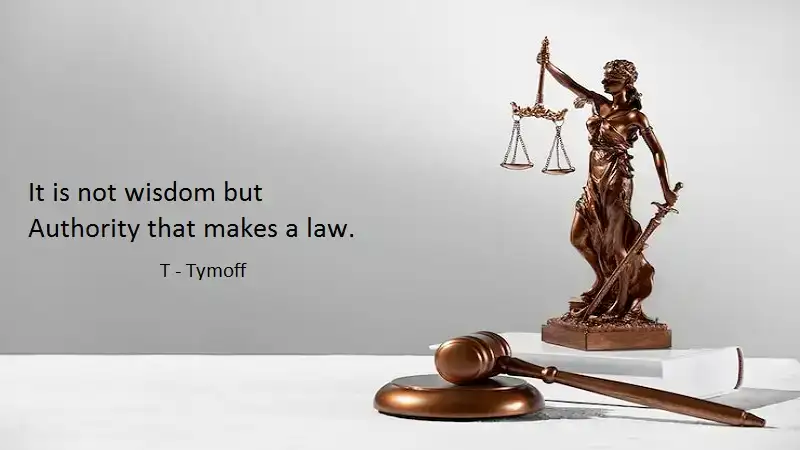Laws have long been the backbone of human civilization, providing structure and order in an otherwise chaotic world. The phrase “it is not wisdom but authority that makes a law. t – tymoff” captures a profound truth about the nature of legislation and its enforcement. While we often like to think of laws as wise, just, and rooted in moral reasoning, the reality is that their legitimacy and application largely depend on the authority behind them. In this article, we will explore the interplay of wisdom, authority, and the law, highlighting the dynamics that govern legal systems worldwide.
The Role of Authority in Lawmaking
Authority plays a pivotal role in the creation, implementation, and enforcement of laws. Without authority, even the wisest regulations would remain mere suggestions. Governments, institutions, and legal bodies derive authority from various sources—constitutional mandates, public support, or even sheer force in some cases. This authority ensures compliance, enabling laws to function effectively in society.
For instance, consider tax laws. While these laws are designed to ensure the financial stability of a nation, their complexity often exceeds the understanding of the average citizen. Compliance isn’t driven by an individual’s grasp of their wisdom but by the enforcement power of the government. The authority to impose penalties and conduct audits underscores why these laws are followed.
Wisdom in Law: A Complement, Not a Substitute
Although authority is crucial, the absence of wisdom in lawmaking can lead to unjust or impractical regulations. Wisdom in this context refers to the ethical and logical foundation of laws—ensuring they are fair, equitable, and adaptable to societal needs. However, as the statement “it is not wisdom but authority that makes a law. t – tymoff” suggests, wisdom alone cannot guarantee a law’s existence or adherence.
Historical examples abound where laws, despite their lack of wisdom, were enforced strictly due to the authority backing them. The Jim Crow laws in the United States are a grim reminder of this phenomenon. These racially discriminatory laws were neither wise nor just, yet they endured for decades because the legal and governmental authorities upheld them.
The Thin Line Between Authority and Tyranny
While authority is essential for lawmaking, it must be exercised responsibly. Overreliance on authority without integrating wisdom can result in oppressive regimes. Tyranny often manifests when authority becomes unchallengeable, turning laws into tools of control rather than instruments of justice.
An illustrative case is the implementation of martial law in some countries. When leaders invoke absolute authority during crises, they may override existing legal frameworks. While this might bring immediate order, it can also suppress fundamental rights, leaving citizens vulnerable to abuse.
To mitigate such risks, modern democracies emphasize the separation of powers—distributing legislative, executive, and judicial functions among different bodies. This approach ensures that authority is balanced, and no single entity has unchecked power over the law.
Why Authority Often Overshadows Wisdom in Law
Several factors explain why authority tends to dominate over wisdom in legal systems:
- Enforcement Capabilities:
Laws need enforcement to be effective. Regardless of how wise a law might be, without mechanisms to ensure compliance, it becomes irrelevant. Authority provides the necessary tools—policing, judiciary systems, and punitive measures—to uphold laws. - Complexity of Societal Needs:
Societies are diverse and multifaceted, making it nearly impossible to create laws that satisfy everyone’s moral or intellectual standards. In such cases, authority serves as a unifying force, enabling laws to be accepted despite differing opinions on their wisdom. - Urgency and Pragmatism:
Legislative bodies often face time constraints, forcing them to prioritize authority over deep philosophical deliberations. During emergencies like pandemics or wars, swift decisions are crucial, and authority becomes the driving force behind lawmaking.
Striking a Balance Between Authority and Wisdom
To create laws that are both authoritative and wise, lawmakers must adopt a balanced approach. This involves:
- Public Participation:
Involving citizens in the legislative process ensures that laws resonate with societal values. Public consultations, referendums, and town hall meetings can bridge the gap between authority and wisdom. - Ethical Oversight:
Independent bodies, such as constitutional courts or human rights commissions, can review laws to ensure they align with moral and ethical standards. - Transparency and Accountability:
Transparency in the legislative process fosters trust, while accountability mechanisms ensure that authority is not abused. This can include regular audits, media scrutiny, and whistleblower protections. - Continuous Revision:
Laws must evolve to address changing societal needs. Periodic reviews and amendments allow legal systems to integrate wisdom while retaining authority.
Modern-Day Implications
In today’s globalized and interconnected world, the relationship between authority and wisdom in law remains as relevant as ever. The emergence of international laws, trade agreements, and digital regulations demonstrates the need for robust authority to enforce compliance across borders. At the same time, these laws must be crafted with wisdom to accommodate cultural differences and technological advancements.
Consider data protection laws like the General Data Protection Regulation (GDPR) in the European Union. These laws derive their authority from stringent enforcement mechanisms, including heavy fines. However, their success also stems from the wisdom embedded in their principles, such as the emphasis on user consent and data transparency.
Conclusion
The statement “it is not wisdom but authority that makes a law. t – tymoff” underscores a fundamental truth about the nature of legal systems. While wisdom enhances the fairness and morality of laws, it is ultimately authority that ensures their implementation and adherence. Striking the right balance between these two forces is crucial for creating a legal framework that is both effective and just.
In an ideal world, laws would seamlessly integrate wisdom and authority, serving as beacons of justice and societal order. While this may be a lofty aspiration, continuous efforts toward inclusive lawmaking, ethical governance, and vigilant oversight can bring us closer to this goal. Laws may be born out of authority, but their legacy is shaped by the wisdom—or lack thereof—infused into their execution.
Visit my site for More Information
